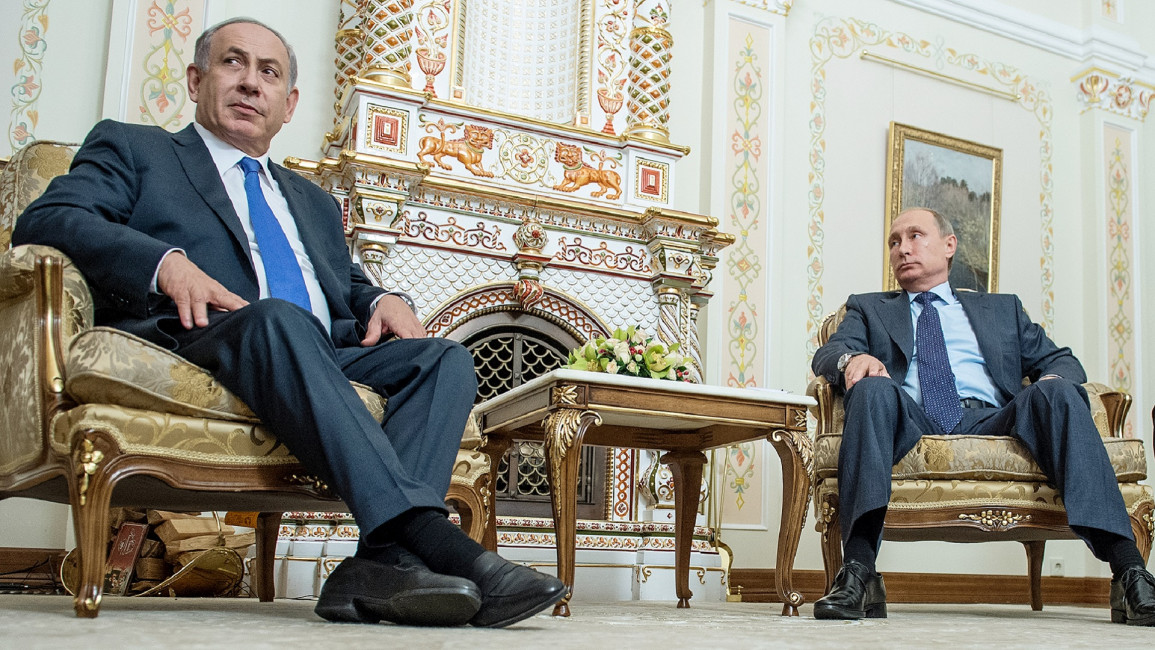Russian envoy's 'secret visit' to Israel after Kuntar killing
Russian President Vladimir Putin's "special Syria envoy" visited Israel secretly last Thursday, where he briefed senior Israeli officials on international contacts to "end the Syrian civil war".
Alexander Lavrentiev visit was said to be be related to Israel's concerns that an international agreement over Syria could strengthen Iran and its Lebanese proxy Hizballah, according to Israeli media reports.
Prime Minister Binyamin Netanyahu had already spoken with the Russian president by phone, earlier this week.
A statement from the Kremlin said Putin told the Israeli leader there was no substitute for UN-backed negotiations aimed at a diplomatic solution to the Syrian crisis.
The Israeli Foreign Ministry declined a request from Israeli daily Haaretz to comment about the purported meeting.
Lavrentiev was personally appointed by Putin and only took office a few weeks ago.
 |
There is concern in Israel a peace deal in Syria would be at the expense of Tel Aviv's interests |  |
He reportedly arrived in Israel in a special Russian Air Force plane at the head of a large delegation including Sergey Vershinin, the head of the Middle East desk in the Russian foreign ministry.
Members of the Russian intelligence also attended the visit.
The delegation was hosted by National Security Adviser Yossi Cohen, who is set to take up the post of Mossad chief in a few weeks.
A senior Israeli official told Haaretz that Cohen presented Israel's points of interest to the Russians.
This included, maintaining Israel's "freedom" to launch "preemptive" attacks inside Syria, and preventing advanced weaponry being moved from Syria and Lebanon, where anti-Israeli militant group Hizballah are based.
Israeli officials also reportedly made it clear that in the event of an agreement Syria would have cease its territory being used directly or indirectly for attacks on Israel.
Lavrentiev's visit to Israel is part of a tour of five capitals in the region to present the Russian plan a peace deal in Syria.
On Saturday, Lavrentiev met Egypt President Abdel-Fattah al-Sissi, and then flew to Abu Dhabi to meet with senior United Arab Emirates officials.
Profound cooperation
Ever since its Moscow launched air raids in Syria, it is said to have closely coordinated its attacks with Israel.
Russia created a "hotline" with Tel Aviv for so-called "deconfliction measures", to avoid air incidents between the two countries' air forces over Syria.
Earlier in December, Putin and Netanyahu pledged to broaden "deconfliction measures" to include forces operating from the ground as well.
"I hope that Israel and Russia can see eye-to-eye on all the strategic matters, but I want to assure you that we believe that it's within our powers to have very good coordination on the ground and in the air," Netanyahu said after the meeting.
 |
Moscow and Tel Aviv have a hotline to coordinate both air and ground operations, according to multiple reports |  |
Netanyahu said he was "very satisfied by the fact that our militaries have been very careful to coordinate with one another and will continue to do so".
Full margin of freedom
Security sources have also claimed Russia quietly accepts Israeli operations against Hizballah and other targets in Syria. This is viewed as part of its "legitimate war" on terror, Israeli media have reported.
"In the understandings with the Russians, we retain freedom of action in our attempts to prevent weapons getting through from Iran to Hizballah," Amos Gilad, a leading figure in the defence ministry said last November.
Last week, Israel's Ambassador to Russia Zvi Heifetz said "Israel understands Russia's interests in the current geopolitical situation and support its efforts against international terrorism.
"As concerns the geopolitical situation, naturally, we understand Russia's interests," he added during a meeting with Konstantin Kosachev, chairman of the international committee of Russia's upper parliament.
 |
Russia gives Israel full operational freedom in Syria and sees its anti-Hizballah operations there as legitimate counterterrorism operations, which possiby includes consenting to assassination of Samir Kantar |  |
Israel, according to the ambassador, supports Russia's steps "to protect the world and civilisation from a certain group of bloodthirsty extremists".
"We have had such experience and we are ready to share it with our friends," he declared.
In light of these profound ties between Moscoe and Tel Aviv, many analysts believe Israel's assassination of Hizballah commander Samir Qantar in Syria last week could not have taken place without Russia's knowledge.
The Israeli strike had targeted Jaramana, an area far from the Golan Heights, and deep into Russian-dominated airspace in Syria.


![Minnesota Tim Walz is working to court Muslim voters. [Getty]](/sites/default/files/styles/image_684x385/public/2169747529.jpeg?h=a5f2f23a&itok=b63Wif2V)




![Debris near Rafic Hariri International Airport [Getty]](/sites/default/files/styles/image_330x185/public/2176162423.jpeg?h=a5f2f23a&itok=MCSK9mkM)
![An Israeli air strike on Jabalia killed teenage journalist Hassan Hamad [Screengrab/X]](/sites/default/files/styles/image_212x120/public/2024-10/hassan%20hamad1.jpg?h=c12e0b96&itok=KstD_5xk)
